City officials clarify proposed social services transfers, explain their necessity
Daily file photo by Katie Pach
Former Evanston Police Chief Richard Eddington sits at a Human Services Meeting. Eddington will replace current Interim Chief Aretha Barnes, who announced her retirement earlier this month.
October 30, 2017
City officials on Saturday addressed resident concerns surrounding the restructuring of social services in the Evanston Police Department, clarifying that the changes are structural and meant to meet residents’ changing needs.
The restructuring plan is part of the proposed 2018 city budget, and includes a transfer of the Social Services Bureau from the police department to the Health and Human Services Department. With the shift, the bureau would lose $400,000 in funding and undergo significant changes.
At a special City Council meeting, Evanston Chief of Police Richard Eddington said EPD has previously relied on expensive credentialed social workers to offer short- and long-term counseling, Eddington said.
However, in recent years, residents have been more reliant on referrals to outside assistance from advocates in the department. He said this changing need allows the department to reorganize its services and eliminate the expense of employing credentialed social workers.
“There will be changes, but the victims will not be ignored,” Eddington said. “In the health department, we’ve been intentional about providing services to vulnerable populations, to at-risk populations and populations in crisis.”
City manager Wally Bobkiewicz said the changes would not affect the quality of services available to residents.
“The intention here is not to provide less service, but to leverage the services that we have in a better way,” Bobkiewicz said. “I want to make sure as we start with this transition that those people that are in need continue to get that initial crisis service from city of Evanston staff.”
Health and Human Services director Evonda Thomas-Smith, whose department would oversee the new positions, said the police Social Services Bureau is currently staffed by a manager, three victim advocates and one youth advocate.
Under the new changes, the city will employ one full-time senior human services advocate and three part-time workers who will also serve as liaisons to schools and other agencies, and be on-call to provide services as needed. Thomas-Smith said the positions will continue to be housed in the police department, but report to her department.
She said the expectation for the new positions in the health department is that they are able to work together with other departments to support victims and those working through trauma and tragedy.
“These positions will be coordinators,” Thomas-Smith said. “The hope is that we get the right mix … (including) those with an understanding of the cultural and linguistic sensitivity that must be present to serve those in this community.”
At Saturday’s meeting, officials also introduced a transfer of a youth advocate from the police Social Services Bureau to the Parks, Recreation and Community Services Department. Lawrence Hemingway, the department’s director, said this change would allow the youth advocate to enter information about an individual into a city-wide database and see if other family members are seeking help.
He stressed that the type of services offered to families wouldn’t change, and the position would still be housed at the police department.
Janet Alexander Davis, a 5th Ward resident who attended the meeting, disagreed with the proposed shift away from credentialed social workers. She said her work for nonprofits in the 1990s took her to police departments across the country, where she noticed how the presence of social workers made a big difference for people impacted by trauma or in need of victim services.
Even with the clarification by city officials that the new shifts would not reduce services provided to residents, Alexander Davis told The Daily she was still concerned about the removal of licensed social workers.
“I don’t think we should put non-degreed people in an area where we are seeing more and more trauma,” she said. “You can’t train (people) for something that I think takes a four-year degree or a six-year degree.”
Email: [email protected]
Twitter: @kristinakarisch


